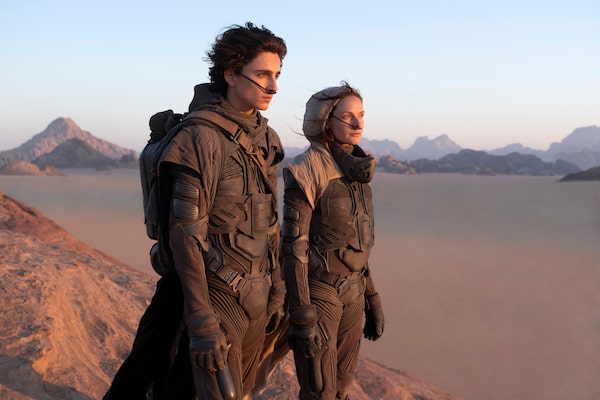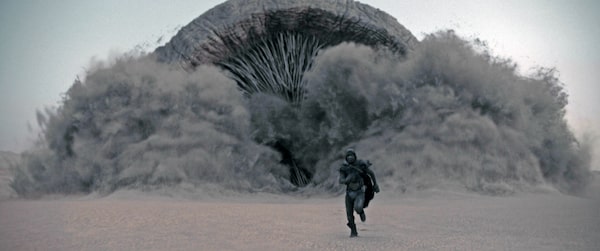
Timothee Chalamet, left, and Rebecca Ferguson in a scene from Dune.Chia Bella James/The Associated Press
Plan your screen time with the weekly What to Watch newsletter. Sign up today.
Dune
Directed by Denis Villeneuve
Written by Denis Villeneuve, Eric Roth and Jon Spaihts, based on the novel by Frank Herbert
Starring Timothée Chalamet, Rebecca Ferguson and Oscar Isaac
Classification PG; 155 minutes
Opens in theatres Oct. 22
Critic’s Pick
Denis Villeneuve’s Dune is, at its best moments, pure and gigantic cinematic madness.
There are spaceships the size of oceans, ferocious desert creatures fit to swallow cities, and sand storms destructive enough to give T.E. Lawrence nightmares. As Villeneuve introduces us to the vast (and vastly complicated) universe of Frank Herbert’s novel – set many tens of thousands of years into the future, when interstellar space travel is the norm, computers are obsolete, and human civilization has become only semi-recognizable – the filmmaker builds a world (or worlds, rather) with magnificent skill, intense imagination and a near-fanatical devotion to his source material.
Decades prior, Alejandro Jodorowsky and David Lynch discovered that you have to be more than a little crazed to adapt Dune, what with its royal houses, interplanetary grudges, hallucinogenic natural resources and secret sorority of female psychics pulling all of the universe’s strings. But Villeneuve’s new film – after Blade Runner 2049, the director’s second go at reviving a creative property once deemed inviolable – proves that the Canadian director is just the right kind of big-screen madman.
Yet for all of the movie’s mammoth outréness – I almost forgot about its levitating Jabba the Hutt-sized villain – the most gonzo element of Villeneuve’s Dune is that its full on-screen title is Dune: Part One – and there is no telling when Part Two may or may not be made.
There was no filming back-to-back, like on Lord of the Rings and Harry Potter and the Deathly Hallows, and the sequel has yet to be officially greenlit by studio Warner Bros. I acknowledge that compressing all 863 pages of Herbert’s 1965 book into one film is a fool’s errand (see again Lynch and Jodorowsky, plus that 2000 Sci Fi Channel miniseries that no one likes to talk about). But to go into production on such an epic act of storytelling by cleaving the story in two without an absolute guarantee on the delivery of the second half is a special kind of optimistic outrageousness.

The film is an adaptation of Frank Herbert’s 1965 novel.Courtesy of Warner Bros. Picture/Courtesy Warner Bros. Entertainm
For all of Dune’s magnificent achievements and ambitions, audiences (whether they have read Herbert’s story or not) are destined to leave Villeneuve’s film wanting and waiting – possibly forever.
So, with that caveat, most of Dune: Part One’s 155 minutes are tremendously entertaining. It looks and moves like a true Hollywood bonanza: All the many millions and millions of dollars it cost to make the film are right up there on-screen, its IMAX-sized visuals designed to shock and awe.
Even before he made his English-language debut with 2013′s Enemy, Villeneuve has been accused of possessing a cold eye, distant and unsparing. I’m not sure that’s quite right. The director operates at a remove, but only so that his audience can approach his film’s intimidating, towering objects (be they characters, stories, cities and/or entire worlds) with as much careful caution as he deems necessary. You start at a distance, then gently become deeply immersed.
In Dune, as Villeneuve sweeps us from the lush greenery of the planet Caladan to the harsh desert environs of Arrakis – Hans Zimmer’s pounding, thudding, relentless score carrying us along – the filmmaker ensures that we feel the otherworldly weight and intensity of this universe.
Villeneuve and his co-writers Eric Roth and Jon Spaihts are almost as successful in digesting Herbert’s supersized themes – colonialism, environmental destruction, religious folly – and overflowing narrative. The film’s first half-hour tidily packs in a whopping amount of exposition, introducing us to the powerful Atreides dynasty, composed of the kind but firm Duke (Oscar Isaac), his enigmatic concubine Lady Jessica (Rebecca Ferguson), and their son Paul (Timothée Chalamet).
For reasons mysterious and foreboding, the unseen Galactic Emperor has just awarded House Atreides stewardship of Arrakis. The sand-covered planet, previously ruled by the brutal House Harkonnen, is home to the universe’s most precious natural resource: “Spice” – which, in addition to being a prized hallucinogenic for the planet’s indigenous Fremen people, is an essential element in powering interstellar travel.
Once the Atreides clan is on Arrakis, they encounter enemies both familiar and unknown, leading to a full-scale war that hinges on the strange dreams plaguing Paul. There are sword and gunship battles, electronic body shields, plenty of talk about Paul’s messianic potential, and, yes, those pesky sandworms: gargantuan, sphinctoral desert beasts that consume everything and everyone in their paths. It’s all highly engaging, adventurous material, even if you’re the type of person who runs far away from anything involving the words “prophecies” and “space guilds.”
Certainly, there are moments when things fall apart. The motivations of a key character like House Atreides doctor Wellington Yueh (Chen Chang) remain frustratingly underdeveloped, and the screenwriting trio speed past explaining just what Lady Jessica’s membership in the secretive Bene Gesserit order is all about. Then again, it’s not as if Herbert’s original prose gave them much of a head start. The author was a genius in fantastical world-building, less so in constructing beautiful and interesting sentences.

Most of Dune: Part One’s 155 minutes are tremendously entertaining as it looks and moves like a true Hollywood bonanza.Courtesy of Warner Bros Pictures
But even if Villeneuve tasked his actors with reading out Herbert’s dialogue verbatim, they’d find a way to make it sing. This is a tremendously stacked cast, including regular Villeneuve collaborators (Josh Brolin, Dave Bautista, David Dastmalchian) and powerful newcomers to the director’s repertory company.
Chalamet, for starters, is perfect for the role of the privileged, frustrated and conflicted Paul. Isaac, up until now playing eager bucks, transitions well into the kind and patient patriarch role. Jason Momoa provides much-welcome levity as the gung-ho warrior Duncan Idaho, who might as well be called AquaDune. And Ferguson walks away with the film with what amounts to a series of well-executed stares.
It is a shame that Javier Bardem and Zendaya (who’s featured front and centre in roughly 50 per cent of the movie’s marketing), have about 10 minutes of collected screen time as members of the Fremen. But that’s what happens when you film a story that, just as it approaches a crucial dramatic turning point, stops cold. Maybe one day, not too far into this planet’s future, we’ll be able to see how it ends.
In the interest of consistency across all critics’ reviews, The Globe has eliminated its star-rating system in film and theatre to align with coverage of music, books, visual arts and dance. Instead, works of excellence will be noted with a Critic’s Pick designation across all coverage.
Plan your screen time with the weekly What to Watch newsletter, with film, TV and streaming reviews and more. Sign up today.
 Barry Hertz
Barry Hertz